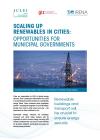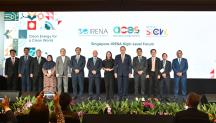

Scaling up renewables in cities: Opportunities for municipal governments
Newsletter
Cities account for the bulk of global energy use. With the urban population growing everywhere, measures at the municipal level are a crucial element in the shift to sustainable, renewable energy sources.
Renewable-based solutions for cities, whether in buildings, power-generation, transport or other systems, help to ensure energy security and fulfill climate commitments, as well as to secure social benefits for urban residents. Fortunately, cities are making progress and achieving key successes in the shift to renewables.
Case studies prepared by the International Renewable Energy Agency (IRENA) in collaboration with ICLEI (Local Governments for Sustainability) and the German Agency for International Cooperation (GIZ) review crucial aspects of the urban energy transition.
The selected cases focus on local policy instruments – including public procurement, ordinances, mandates, and pilot projects – with a focus on ensuring reliable energy supply and on the building and transportation sectors.
Among the cities examined:
- Cape Town, South Africa, has installed rooftop solar photovoltaics (PV) on municipality-operated buildings.
- Rosario, Argentina, has offset requirements for solar water heaters in municipal-owned buildings.
- New Delhi, India, has commissioned 20 megawatts of solar rooftop installations for its metro system.
- Malmö, Sweden, has continually increased its renewable energy targets, aiming to reach 100%.
- Vancouver, Canada, has committed to sourcing 100% of its energy consumption from renewables by 2050.
- Sydney, Australia, has boosted renewables and cut municipal electricity consumption with energy-efficient public lighting.




